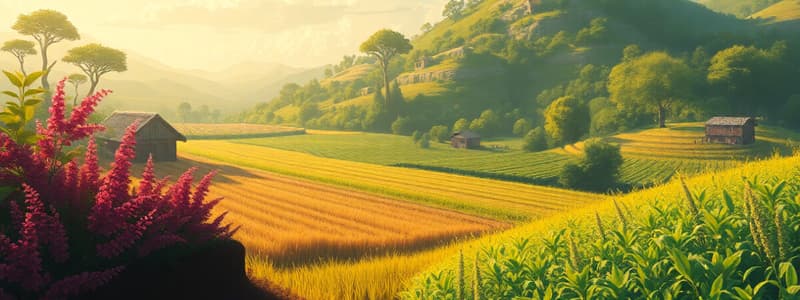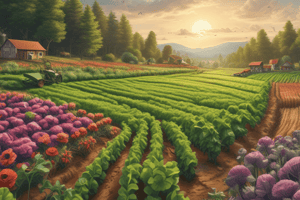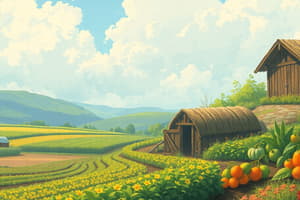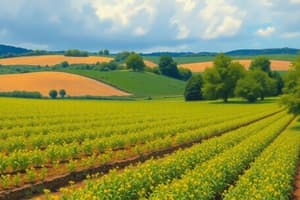Podcast
Questions and Answers
What is one of the common consequences of the practice of monoculture in conventional agriculture?
What is one of the common consequences of the practice of monoculture in conventional agriculture?
- Reduced soil fertility (correct)
- Enhanced pest resistance
- Increased crop diversity
- Improved biodiversity
Which of the following is a significant ecological concern associated with conventional agriculture?
Which of the following is a significant ecological concern associated with conventional agriculture?
- Lower incidence of soil erosion
- Increased groundwater recharge
- Rise in native plant populations
- Nutrient runoff leading to dead zones (correct)
Which farming practice is primarily responsible for housing animals in crowded and unsanitary conditions?
Which farming practice is primarily responsible for housing animals in crowded and unsanitary conditions?
- Conventional livestock farming (correct)
- Crop rotation
- Agroforestry
- Organic farming
What is a major contributor to soil salinization in highly-irrigated areas?
What is a major contributor to soil salinization in highly-irrigated areas?
Which of the following phenomena is exacerbated by overgrazing in livestock production?
Which of the following phenomena is exacerbated by overgrazing in livestock production?
What is a significant ecological consequence of converting tropical rainforests into agricultural fields?
What is a significant ecological consequence of converting tropical rainforests into agricultural fields?
Which of the following is NOT a potential health hazard associated with modern farming practices?
Which of the following is NOT a potential health hazard associated with modern farming practices?
What economic trend has been observed in the U.S. agricultural sector in recent decades?
What economic trend has been observed in the U.S. agricultural sector in recent decades?
Which of the following statements best reflects the challenges faced by potential farmers entering the industry today?
Which of the following statements best reflects the challenges faced by potential farmers entering the industry today?
How has the disappearance of small farms impacted the agricultural landscape in the U.S.?
How has the disappearance of small farms impacted the agricultural landscape in the U.S.?
Flashcards are hidden until you start studying
Study Notes
Conventional Agriculture
- Increased food production globally over the last 50 years, with 70% to 90% of the increase attributed to conventional agriculture.
- US consumers expect abundant and inexpensive food due to conventional farming practices.
- Key characteristics include rapid technological innovation, large capital investments, large-scale farms, monocultures, high-yield crops, reliance on agribusiness, mechanization, and extensive use of pesticides, fertilizers, and herbicides.
- Livestock production often involves concentrated and confined animal systems, raising concerns about animal welfare.
Ecological Concerns
- Soil Degradation: Soil productivity can decline through erosion, compaction, loss of organic matter, and salinization.
- Desertification: Overgrazing contributes to land degradation and the conversion of land into deserts.
- Water Pollution: Agricultural practices contribute to non-point source water pollution through runoff of salts, fertilizers, pesticides, and herbicides.
- Eutrophication and Dead Zones: Nutrient runoff from agriculture leads to excessive growth of algae, which depletes oxygen levels in water bodies, creating dead zones.
- Water Scarcity: Overuse of water for irrigation for agriculture contributes to water scarcity.
- Pesticide Resistance: Over 400 insect and mite pests and over 70 fungal pathogens have developed resistance to pesticides.
- Pollinator Decline: Pesticides and habitat loss due to agricultural expansion have negatively impacted pollinators and other beneficial insects.
- Climate Change: Land-use changes for agriculture and livestock emissions contribute to greenhouse gas emissions.
Economic and Social Concerns
- Federal Expenditures: The US agricultural sector has seen increasing federal spending over time.
- Agribusiness Concentration: Growing concentration of agribusiness into fewer corporations limits market competition and reduces farmer control over prices.
- Farm Loss: Economic pressures have resulted in a significant loss of farms, particularly small farms, over the past decades.
- Barriers to Entry: High business costs make it difficult for new farmers to enter the industry.
- Land Use Change: Urban and suburban sprawl have led to the loss of productive farmland.
Impacts on Human Health
- Antibiotic Resistance: Use of antibiotics in animal production can contribute to the evolution of drug-resistant bacteria.
- Food and Water Contamination: Pesticides and nitrates can contaminate food and water sources.
- Farm Worker Health: Farm workers face physical demands and higher risks of exposure to pesticides.
Philosophical Considerations
- Shift in Cultural Identity: The decline of rural life and farmland ownership has altered American cultural identity and connection to food production.
- Food Security Challenges: Growing global population, particularly in developing countries, poses significant challenges for food security.
Pests and Pesticides
- Pesticide Use: Pesticides are used to control pests, including insects, weeds, fungi, and other organisms.
- Pesticide Risks: Pesticides can harm humans, animals, and the environment due to their toxicity.
- Pesticide Benefits: Pesticides can also be beneficial by controlling disease-causing organisms and pests.
Studying That Suits You
Use AI to generate personalized quizzes and flashcards to suit your learning preferences.




